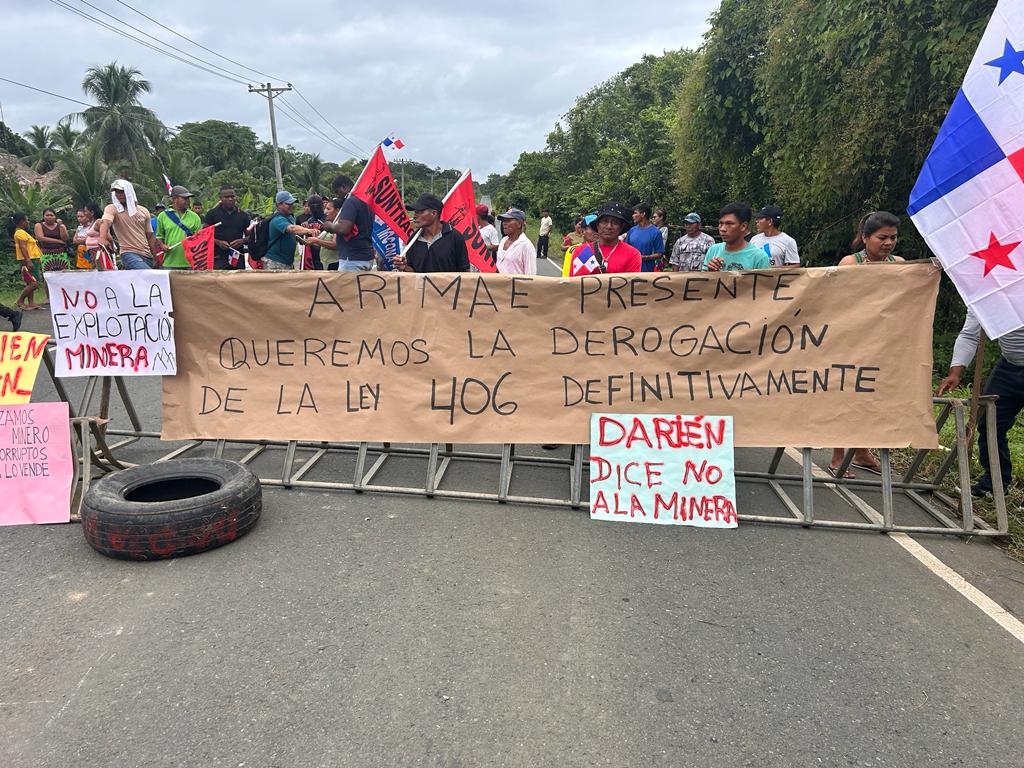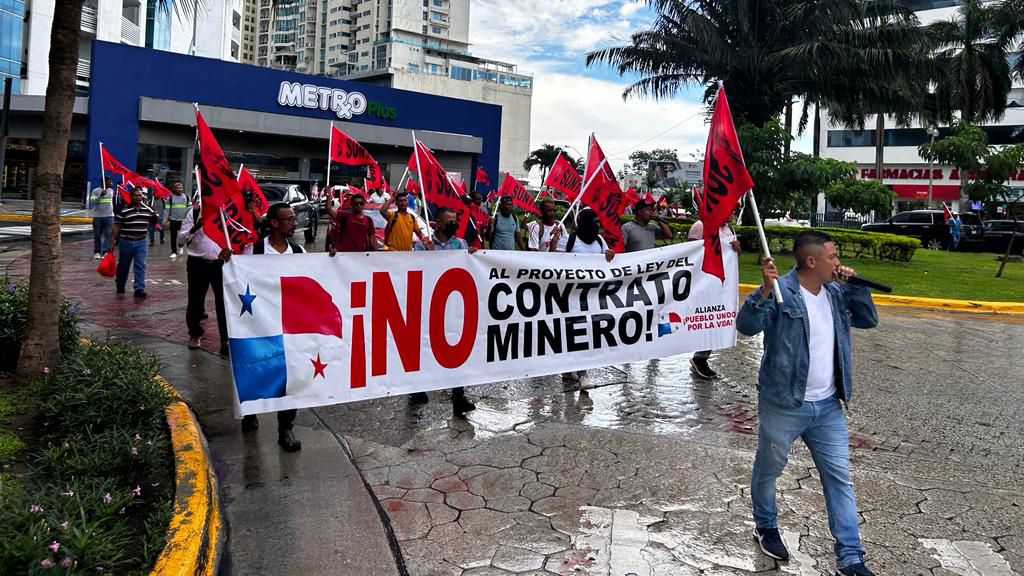Protests continued in Panama on October 25 in rejection of a copper mining contract signed between the government and Canadian multinational, First Quantum Minerals (FQM).
On October 20, Panama’s Congress approved a bill granting FQM’s local subsidiary, Minera Panamá S.A., permission to conduct operations at Cobre Panamá, the country’s largest open-pit copper mine. Even as protestors gathered in the streets outside Congress to protest the bill, it was signed into law later that day by President Laurentino Cortizo.
Over the weekend, the National Union of Workers of Construction and Similar Industries (SUNTRACS) called upon popular forces and trade unions across sectors to mobilize and demand the cancellation of the contract.
“The people are in the streets in defense of sovereignty… in the face of a contract that cedes self-determination by devastating the environment in order to steal resources,” said SUNTRACS General Secretary, Saúl Méndez.

Law 406, which is now in force, grants FQM a 20-year concession for operations at Cobre Panamá, extendable by a further 20 years. The mine is located in the Panama jungle on the Caribbean coast, less than 300 kilometers from Panama City.
The multi-billion dollar concession contract, which is reportedly the largest private investment in Panama’s history, was agreed upon by FQM and Panama in March. In the time since, unions, Indigenous groups, and social movements have held several rounds of protests denouncing the agreement’s terms, highlighting threats to the environment, the rights of Indigenous communities, and the country’s sovereignty.
Among the terms that have drawn condemnation is the authorization granted to FQM to acquire and even expropriate land and an overall lack of transparency and proper public consultation regarding the contract. FQM has further been granted the right to build a power plant, a processing plant, and even an international port to provide services that will be charged but whose benefit will not accrue to the Panamanian government.
Earlier clauses which would have allowed FQM to restrict the country’s airspace and expand its operations beyond copper to include gold and silver were later removed.
In 2022, the government shut down FQM’s operations at Cobre Panamá after unsuccessful negotiations over taxes. This was soon after Panama’s Supreme Court, in 2021, ratified a ruling issued by a lower court which had declared the original mining concession granted to Minera Panamá until 2037 unconstitutional.
Just a few years prior, the Supreme Court (CSJ) had ruled that the law which had governed the concession for the exploitation of the Cobre Panamá back in 1997 was unconstitutional. Despite this ruling, FQM began commercial production at the mine in 2019.
Under the terms of the new contract, Panama will receive a minimum of USD 375 million a year in the form of mining royalties. MINING.COM reported that the government had reportedly sought royalties amounting to between 12% and 15% of the mine’s gross profits, compared to the previously agreed 2%. For instance, in 2021, FQM paid Panama’s government USD 61 million in royalties, comprising less than 2% of the USD 3.2 billion it made in sales for the Cobre Panamá mine.
FQM now stands to pay only an estimated 5% of its profits as royalties. Cobre Panamá is estimated to hold 3.1 billion tonnes in copper reserves. Protesters say that the payments given to the government are insufficient, especially given the environmental threat posed by open-pit mining.
People chanted as they marched in the streets on the first day of protests on October 23: “Down with the vendepatrias [sellouts]!” “No to the mining contract!”, “Stop destroying our lands!” Protesters blockaded roads including the Inter-American Highway that passes through the country.
SUNTRACS was also joined and supported by the Association of Teachers of the Republic of Panama (ASOPROF) which declared a strike beginning on Monday, as well as other organizations including the Union of Electrical and Similar Industry Workers (SITIESPA) and the National Confederation of Independent Trade Union Unity (CONUSI).
“We are going to remain in the streets… the government decided to be confrontational by quickly and expeditiously approving a contract that they knew was rejected by the population,” Fernando Abrego, a teacher leader, told the Associated Press.
Desde la vía España, No más minería. pic.twitter.com/VjlVlVn1vD
— ASOPROF (@ASOPROF30) October 23, 2023
Protests have been reported in Panama City, Arraiján, La Chorrera, Natá, Chiriquí, Colón, Veragues, Capira, La Pintada, and Los Santos. Riot police deployed around the capital also deployed tear gas as confrontations broke out. Around 50 people were detained. Meanwhile, SUNTRACS had assured that safe passage would be granted to essential services and also rejected claims that an ambulance had been vandalized during the protests.
While the government has refused to budge on the contract, Panama is likely to see continued public unrest surrounding this issue. In a statement issued on October 23, the Association of Doctors, Dentists, and Related Professionals of the Social Security Fund (AMOACSS) announced a 72-hour strike across all health facilities beginning on October 25 in protest of the mining contract.
Denouncing Law 406 as a constituting a “robbery of the natural riches of Panama” and a “danger to the environment and water sources and consequently the guarantee of the health of the population,” AMOACSS called upon all other medical unions to forge a united position against mining, to engage in peaceful protests, and called upon the judiciary to address and resolve the claims of unconstitutionality put forth surrounding the contract.
It also called upon the government not to use medical vehicles and ambulances to transport police or supplies for the repression of the protests.
On October 25, SUNTRACS warned that the Cortizo administration had “activated” the national security forces, the Panamanian Public Forces, against leaders of the union. However, Mendez affirmed that the organization would remain firm and that SUNTRACS and the people would reject the “sale of the Homeland” and defend national sovereignty and self-determination.
In addition to the call for a repeal of the contract with FQM, SUNTRACS has also demanded that a national referendum be held on the Cobre Panamá mine.





